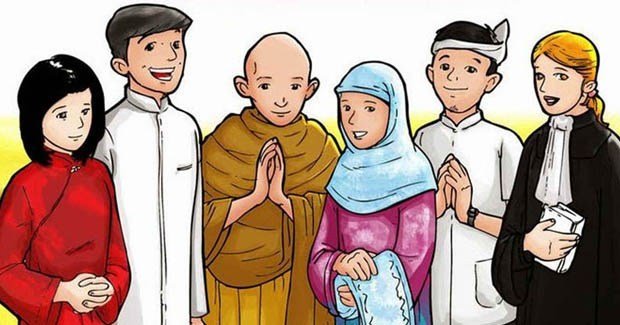
Civis 001/2016
(Republika, Tuesday, October 20th, 2015)
But the problem with these two Abrahamic spiritual heritage was that their disciples did not always grab hold of the basic teachings of their religions in their worldly relations.
Not only wars between the two communities occurred in the past, even internal wars within the same religion was not rare. Here lies the irony of religion in human history.
Perhaps from this perspective, Bertrand Russell cynically wrote: “I think all great religions of the world…both untrue and harmful.”[7] This kind of criticism is to be accepted, so that religion should not be closed its door and is ready to be questioned by a critical mind.
In my interpretation of some verses of the Qur’an, human beings should not only live side by side with their co-religionists peacefully, even with atheists a peaceful cooperation and understanding is possible. In other words, a harmony and social tolerance should be the bounding norm of the human daily life.
The social fabric in this small earth planet will be broken down into pieces, if harmony and tolerance suddenly disappear. The Qur’an says: “And had your Lord willed, those on earth would have believed, all of them together. So will you [O Muhammad] then force mankind, until they become believers?” Here, the principle of free choice and free will within the human domain is fully secured and guaranteed.
With the weapon of Bhinnêka tunggal ika and the correct and authentic understanding of religious teachings, any kind of radicalism in Indonesia, religious, social, or political, can be countered effectively, on the condition that the principle of social justice is seriously implemented into a concrete reality.
Otherwise, this nation will remain confused and vulnerable in mapping its own future. As a great nation, Indonesia should dare confidently to respond successfully to the challenge of the day.
N.B: To Roberta G. Ahmanson, one of the panelists in the dialogue forum, I gave this statement: “At certain times, I felt unhappy living in this country, with so many problems that doesn’t seem to be solved. The justice craved has yet to be reality in this country. Do you feel the same, living in America?” She answered, “Yes, I feel the same!”
It turns out, in a situation where the world becomes more and more unjust and uncomfortable, there are many unhappy people, not because of poverty, but because they are concerned with the fate of people on earth who are still alienated and suffering. Because of the civil war that often happens and the social and economy inequality between the East-West, North-South under an anti-justice political-economy system, is the main reason why some of us find it hard to live peacefully.
This article has been published in the Resonansi Column, Republika Daily on October 13, 2015, titled “Religious Freedom, Tolerance, and Radicalism (II)”. (Source:www.republika.co.id)

Prof. Dr. H. Ahmad Syafii Maarif, MA
Founder, Maarif Institute for Culture and Humanity
The founder of Maarif Institute for Culture and Humanity; President of World Conference on Religion for Peace (WCRP); The leader of Muhammadiyah , one of the two biggest Moslem organizations in Indonesia (1998 – 2005).
